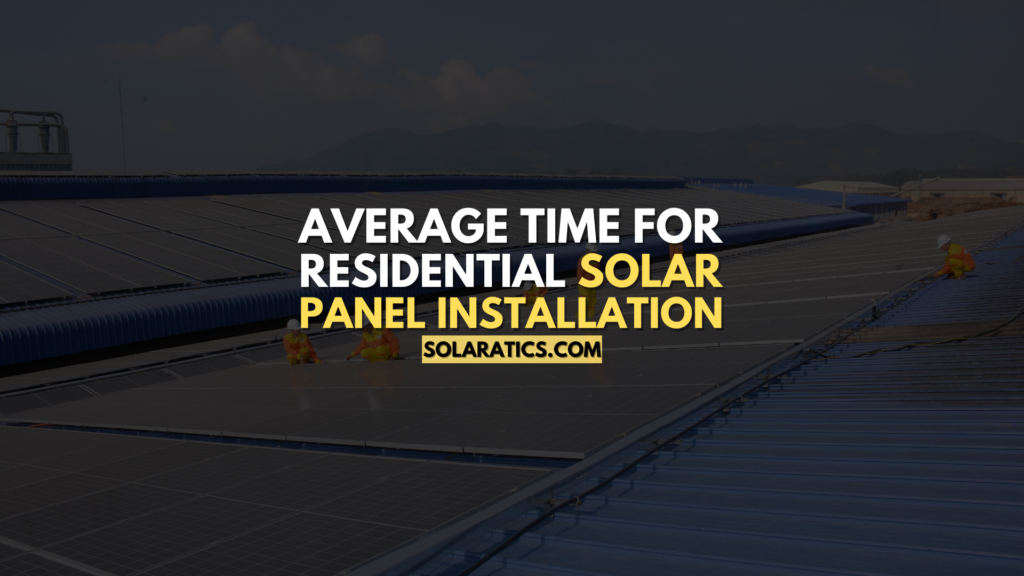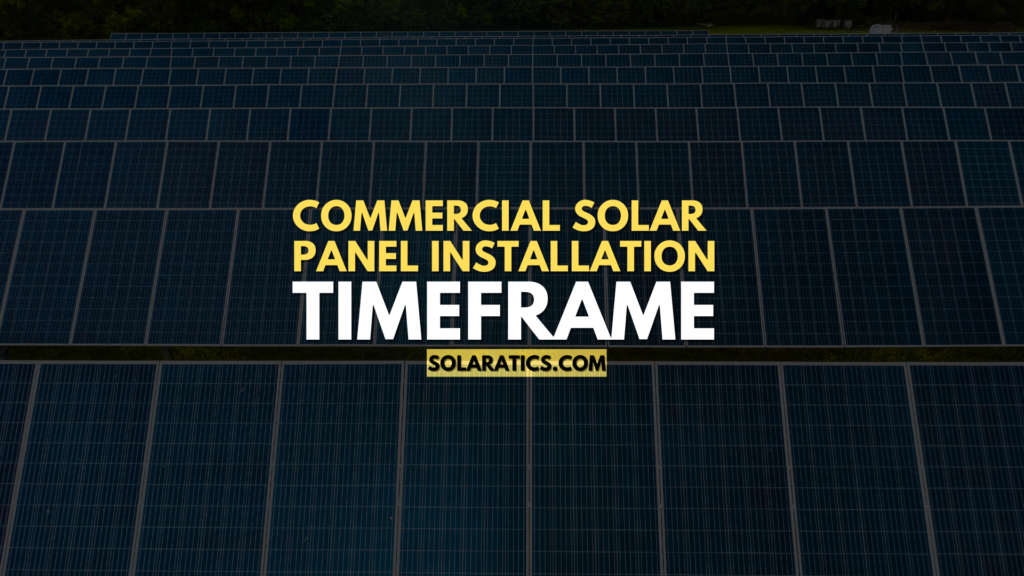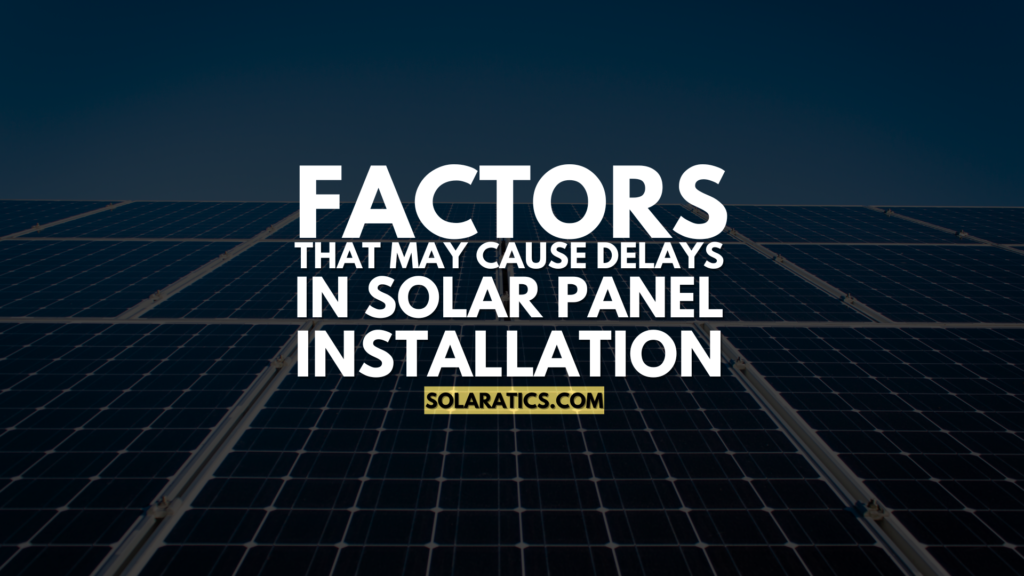How long does a solar panel installation take?

Are you considering investing in solar panels? One important factor to consider is the installation time. Understanding how long it generally takes to install solar panels can help you plan your project and set realistic expectations.
In this article, I’ll provide a comprehensive explanation of the solar panel installation time estimate, discussing the factors that can influence the timeline and providing average durations for both residential and commercial installations.
Key Takeaways:
- Installing solar panels requires careful planning and consideration of various factors that can affect the installation time.
- The size of the installation, roof condition, electrical setup, and necessary permits or inspections are some of the factors that can impact the duration.
- On average, residential solar panel installations may take several weeks or even months, from the initial site assessment to the final connection to the electrical grid.
- Commercial solar panel projects generally have longer installation timeframes due to the complexity of larger systems and additional requirements.
- Certain variables, such as challenging roof structures or customized system configurations, can extend the installation time.
Factors Affecting Solar Panel Installation Time
When it comes to installing solar panels, several factors can influence the overall time it takes to complete the installation. It’s important to consider these factors to ensure a smooth and efficient process. The following are some key considerations that can affect solar panel installation time:
Size of the installation:
The size of the solar panel system can significantly impact the installation time. Larger systems may require more panels to be installed, resulting in additional labor and time.
Roof condition:
The roof condition where the panels will be installed can also affect the installation timeline. If the roof needs repairs or reinforcement before the panels can be installed, additional time may be required.
Electrical setup:
The existing electrical setup of the property plays a crucial role in determining the installation time. If significant upgrades or modifications are necessary to accommodate the solar panels, it can add to the overall installation timeline.
Permits and inspections:
Obtaining the necessary permits and undergoing inspections can contribute to the installation time. The duration of these processes can vary based on location and local regulations.
By considering these factors and planning accordingly, individuals can better understand the time it may take to complete their solar panel installation. It’s essential to work with experienced professionals who can assess the specific requirements of the project and provide an accurate estimate.
“The successful installation of solar panels requires careful consideration of various factors, from the size of the system to the condition of the roof. By understanding these factors, individuals can make informed decisions and ensure a smooth installation process.” – Solar Expert
| Factor | Impact on Installation Time |
|---|---|
| Size of the installation | Longer installation time for larger systems |
| Roof condition | Potential delays for repairs or reinforcement |
| Electrical setup | Additional time required for upgrades or modifications |
| Permits and inspections | Time required to obtain permits and undergo inspections |
Average Time for Residential Solar Panel Installation

When it comes to residential solar panel installations, the average time from the initial site assessment to the final connection to the electrical grid can vary depending on several factors.
On average, a residential solar panel installation can take anywhere from one to three months to complete. It’s important to note that this timeline is just an estimate and can be subject to change based on individual project specifications and external circumstances.
During the installation process, there are several steps involved that contribute to the overall duration. These include:
Site Assessment:
A thorough assessment of the property is conducted to determine its suitability for solar panel installation. This includes evaluating factors like roof orientation, shading, and structural integrity.
Design and Permitting:
Once the site assessment is complete, the solar panel system is designed based on the specific energy needs and requirements of the homeowner. This design is then submitted for permitting approval, which can take a few weeks.
Procurement and Delivery:
After the necessary permits are obtained, the solar panel components and equipment are procured and delivered to the installation site.
Installation:
The installation process involves mounting the panels on the roof, connecting them to the electrical system, and ensuring proper wiring and functionality.
Inspection and Connection: After the installation is complete, a final inspection is conducted to verify compliance with local codes and regulations. Once the system passes inspection, it can be connected to the electrical grid.
While these steps may seem straightforward, various factors can impact the overall installation time. These factors include:
- Roof Complexity: If the roof has a complex structure or requires reinforcement, it can add extra time to the installation of Solar panels on the roof process.
- Permitting Process: The time taken to obtain permits can vary depending on local regulations and the efficiency of the permitting authority.
- Weather Conditions: Inclement weather, such as heavy rain or snow, can delay the installation process as it may not be safe or practical to work on the roof during these conditions.
- Utility Interconnection: The time taken for the utility company to connect the solar panel system to the electrical grid can also impact the overall installation timeline.
It’s important for homeowners considering solar panel installation to be aware of these factors and work closely with their chosen installer to establish clear timelines and expectations. By doing so, they can ensure a smooth and timely installation process.
Commercial Solar Panel Installation Timeframe

When it comes to commercial solar panel installations, the timeframe can vary depending on several factors specific to these larger-scale projects. Understanding the estimated installation time is crucial for businesses to plan and budget effectively.
In this section, I will outline the key considerations that can impact the duration of commercial solar panel installations and provide a general timeframe for completion.
Factors Affecting Commercial Solar Panel Installation Time
The installation timeline for commercial solar panel projects can be influenced by various factors, including:
- The size and complexity of the installation
- The condition of the roof and structural requirements
- The electrical setup and power distribution requirements
- The need for specialized equipment or customized system configurations
- The availability of permits and inspections
Each of these factors can add complexity and time to the installation process, making it essential for businesses to work with experienced solar professionals who can efficiently manage these considerations.
General Timeframe for Completion
On average, commercial solar panel installations can take anywhere from several weeks to a few months to complete. However, it’s important to note that this timeframe can vary significantly depending on the size and complexity of the project, as well as local regulatory requirements.
The table below provides a general overview of the typical installation timeframe based on the size of the commercial solar panel project:
| Project Size | Installation Timeframe |
|---|---|
| Small-Medium (10 kW – 100 kW) | 4-8 weeks |
| Medium-Large (100 kW – 1 MW) | 8-12 weeks |
| Large (1 MW and above) | 12+ weeks |
Please keep in mind that these timeframes are estimates, and actual installation durations may vary based on the specific project requirements and local conditions.
In the next section, I will explore the variables that can extend the solar panel installation time, helping businesses anticipate potential delays and plan accordingly.
Variables That Can Extend Solar Panel Installation Time
During the process of installing solar panels, certain variables can contribute to the extension of the installation time. These variables should be taken into consideration when planning a solar panel installation project. Some factors that may increase the duration of the installation process include:
Challenging roof structures:
If the roof of the property presents complex features such as multiple levels, steep slopes, or irregular shapes, it may require additional time and effort to properly install the solar panels.
Customized system configurations:
When designing a solar panel system that caters to specific energy needs or aesthetic requirements, the customization process can add extra time to the installation. This includes factors like panel layout, wiring configurations, and integration with the existing electrical system.
Required upgrades or modifications to the electrical system:
In some cases, the electrical infrastructure of the property may need upgrades or modifications to accommodate the solar panel system. This could involve rewiring, installing new Breakers in a 200 amp Panel, or making adjustments to the main electrical panel.
Factors Affecting Solar Panel Installation Time Extension
It is important to take these variables into account during the planning phase of a solar panel installation project, as they can significantly impact the overall timeline. The complexity of the roof structure, the level of customization required, and the extent of electrical system upgrades or modifications needed should all be assessed by a professional installer.
By properly understanding and addressing these variables, homeowners can ensure a smooth and efficient solar panel installation process, ultimately leading to the timely completion of their project.
| Variable | Impact on Installation Time |
|---|---|
| Challenging roof structures | Can increase installation time due to the need for precise panel placement and additional structural considerations. |
| Customized system configurations | May prolong the installation process as panel layout, wiring configurations, and integration with the electrical system require careful planning and execution. |
| Required upgrades or modifications to the electrical system | Can extend installation time as electrical infrastructure may need to be upgraded or modified to meet the requirements of the solar panel system. |
Accelerating Solar Panel Installation Time
In order to accelerate the installation of solar panels, several strategies and circumstances can be considered. By focusing on pre-installation preparations, implementing streamlined processes, and working with experienced installation teams, the overall installation time can be significantly reduced.
Pre-installation Preparations
Prior to the installation of solar panels, certain preparations can be made to expedite the process. This includes conducting a thorough site assessment to identify any potential obstacles or challenges that may arise during installation. By addressing these issues beforehand, delays can be minimized, resulting in a faster installation time.
Streamlined Processes
Implementing streamlined processes throughout the installation can also contribute to a faster timeline. This involves efficient coordination between the various team members involved, such as electricians, roofers, and installers. By ensuring clear communication and a well-coordinated workflow, the installation process can be completed more rapidly.
Experienced Installation Teams
The experience and expertise of the solar installation team can have a significant impact on the installation time. Working with professionals who have extensive knowledge and experience in solar panel installations can lead to a smoother and more efficient process.
They understand the intricacies of the installation process, which allows them to identify potential issues and find solutions quickly, ultimately accelerating the installation time.
By employing these strategies and considering these circumstances, homeowners and businesses can accelerate the installation of solar panels, allowing them to start benefiting from renewable energy sooner.
Factors That May Cause Delays in Solar Panel Installation

In the process of installing solar panels, there are various factors that can potentially cause delays. These delays can range from unexpected technical difficulties to external factors beyond our control. It’s important to be aware of these potential obstacles and take proactive measures to mitigate and manage them.
Weather Conditions
One significant factor that can lead to delays in solar panel installation is adverse weather conditions. Inclement weather such as heavy rain, snow, or storms can make it unsafe for installation teams to work on rooftops. In such cases, the installation may need to be rescheduled, causing delays in the overall timeline.
Supply Chain Issues
Another potential cause of delays is supply chain issues. Solar panel installations require various components and equipment, and any delays in the delivery of these items can impact the installation schedule. Factors such as manufacturing delays, transportation challenges, or unexpected demand spikes can all contribute to disruptions in the supply chain.
Unexpected Technical Difficulties
During the installation process, unforeseen technical difficulties may arise that can cause delays. These difficulties can include compatibility issues, wiring complications, or the need for additional equipment or modifications. It’s important to have experienced installers who can quickly identify and address these challenges to minimize any delays.
Tips for Mitigating and Managing Delays
While delays in solar panel installation can be frustrating, there are steps that can be taken to mitigate and manage these issues:
- Thorough Planning: A comprehensive site assessment and detailed project planning can help identify potential challenges and develop contingency plans.
- Effective Communication: Maintaining open lines of communication between installers, suppliers, and customers can help address any delays promptly.
- Flexible Scheduling: Allowing for flexibility in scheduling can help accommodate unexpected delays and reschedule installations as needed.
- Professional Expertise: Hiring experienced solar panel installers who have dealt with various installation scenarios can help navigate potential delays more efficiently.
By being proactive and implementing these strategies, homeowners and businesses can effectively manage and minimize delays during the solar panel installation process.
Solar Panel Installation Time by System Size
When it comes to installing solar panels, the size of the system plays a significant role in determining the overall installation time. Larger systems typically require more components of wiring, leading to a longer installation process. On the other hand, smaller residential systems can be completed relatively quickly.
Here are the estimated installation times based on system size:
| System Size | Installation Time |
|---|---|
| Small Residential System | 1-2 days |
| Medium-sized Installation | 2-3 days |
| Large Commercial Project | 1-2 weeks |
It’s important to note that these estimates are general guidelines and can vary depending on various factors, such as the complexity of the installation, roof condition, and electrical setup. Additionally, project-specific requirements, such as permits and inspections, can also impact the overall installation time.
By understanding the estimated installation times for different system sizes, homeowners and business owners can better plan their solar panel projects and have a realistic expectation of the time it will take to complete the installation.
Hiring Professional Solar Panel Installers
When it comes to solar panel installation, hiring professional installers is crucial for ensuring a smooth and efficient process. Professional installers bring expertise, experience, and specialized knowledge to the table, ensuring that your solar panels are installed correctly and in a timely manner.
Choosing the right solar panel installers can make all the difference in the success of your installation project. Here are some qualifications to look for when hiring professionals:
- Proper Certification: Make sure that the installers you choose are properly certified and licensed. Look for certifications from reputable organizations such as the North American Board of Certified Energy Practitioners (NABCEP).
- Experience: Consider the experience of the installers. Look for companies or individuals who have a proven track record of successful solar panel installations.
- Knowledge of Local Regulations: Solar panel installations often require permits and adherence to local regulations. Hiring installers who are familiar with these regulations can help avoid unnecessary delays and complications.
- References and Reviews: Ask for references and read reviews from previous customers. This can give you valuable insights into the quality of work and customer satisfaction provided by the installers.
“Hiring professional solar panel installers not only ensures a timely installation but also provides peace of mind knowing that the job will be done right.” – John Smith, Solar Energy Customer
Working with professional installers offers several benefits:
- Efficiency: Professional installers have the knowledge and expertise to complete the installation quickly and efficiently. They know how to navigate challenges that may arise during the process, minimizing delays and ensuring a smooth installation.
- Quality Workmanship: Professional installers are trained to install solar panels correctly, ensuring that they are securely mounted and wired for optimal performance and safety.
- Warranty Protection: Many professional installers offer warranties on their work. This means that if any issues arise after the installation, you can rely on their expertise to address and resolve them.
Qualifications to Look for in Professional Solar Panel Installers
| Qualification | Description |
|---|---|
| Proper Certification | Look for installers with certifications such as NABCEP |
| Experience | Consider installers with a proven track record of successful installations |
| Knowledge of Local Regulations | Hire installers familiar with local regulations and permitting processes |
| References and Reviews | Ask for references and read reviews from previous customers |
By hiring professional solar panel installers, you can ensure a smooth, efficient, and high-quality installation. Take the time to research and choose installers who are qualified, experienced, and trusted by their customers. Your investment in professional installation will pay off in the long run, providing you with reliable and efficient solar energy for years to come.
Conclusion
In this article, we have explored the factors influencing solar panel installation time and provided average estimates for both residential and commercial projects. It is important to note that several variables can extend the installation process, such as roof complexity and custom system configurations.
However, there are strategies and circumstances that can accelerate installation time, such as pre-installation preparations and experienced installation teams. It is essential to hire professional solar panel installers who possess the necessary qualifications and expertise to ensure a timely and efficient installation.
Overall, while we have provided average time estimates, it is crucial to consult with solar experts for personalized estimates that consider your specific requirements. Investing in solar panels is a significant decision, and considering various factors will help you make an informed choice, ensuring a seamless installation process and long-term energy savings.
To process smoothly. They can also ensure compliance with safety regulations, help with any necessary permits, and provide post-installation support. Working with professionals can help avoid mistakes or delays that can occur with amateur installations.
